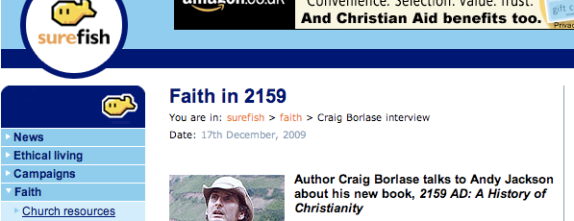[an article written for Stewardship – a really great charity that aims to encourage generosity wherever it is found]

When President Obama mentions your work by name and Will and Jada Smith forgo birthday gifts to raise over $100,000, your charity can rest a little easy, right? Not if you’re Scott Harrison, founder and CEO of charity: water – or any of the nearly billion people they still intend to help.
Believe it or not, the aim of solving the world’s water crisis is not the only item on charity: water’s agenda. As Scott explains, the US non-profit organisation exists “to bring clean drinking water to one billion people and restore faith in giving, to reinvent charity and bring people back to the table of generosity.”
It’s a challenge of epic proportions, and – fittingly – is the result of a remarkable God-scripted transformation.
“I grew up in the church and was very active until about 18,” explains Scott. “I was filled with faith and living it out. Then there were ten years of rebellion, of doing all the things that I hadn’t been allowed to do.” That season away from God was played out in New York – in high-end nightclubs and on Caribbean islands reached by private jets. It was, he admits, ‘painfully cliché’.
“After 10 years I had a moment of introspection. I was dating a model, owned a Rolex watch, a BMW, a grand piano and a golden retriever. I had ticked the boxes of success… and there was a hole, an emptiness.”
It was a moment of revelation that changed everything. “I saw that I would never find happiness, purpose or fulfilment in the things that I was chasing. There would never be enough girls, never be enough money, never be enough fame or status. I looked at people who had more of all of that – more money, more girls, more status – and they were miserable.”
And so, thanks to the unfailing grace of God (as well as the writings of A.W. Tozer), Scott’s journey changed course. He abandoned the life and trappings of a nightclub promoter and reconnected with his faith. And like the younger son in the parable, he found that returning home was far simpler than he might have thought:
“What was surprising was how easy it was to come back. I hadn’t lost my faith, I’d just lost obedience. I’d disobeyed for ten years, not turned into an atheist.”
*
It is not only wayward nightclub promoters who might consider selfishness a virtue and ambition-at-all-costs, an essential. There are so many of us who – to a degree – subscribe to a “me first” philosophy that it barely registers as a problem. And yet throughout the whole of Scripture we see the same lesson being taught: God calling His people to turn away from living purely for themselves and find instead the true freedom that comes from following Him. And as that first domino falls we see that selflessness leads to compassion, which leads to generosity, which leads to the transformation and restoration we so deeply crave.
A year or so after he returned, that sequence began in earnest for Scott. He was sharing a cramped cabin with cockroaches and crew members on board a hospital ship. They sailed up and down the West African coast for two years performing vital surgeries as part of the Mercy Ships charity. Volunteering as a photojournalist, Scott saw extreme poverty firsthand, encounters which left him in pieces, run raw by compassion.
What’s more, he witnessed – like his return to faith – the relative ease with which lives can be transformed. Specifically he saw in the stagnant ponds and arduous, dangerous journeys lugging dirty H20 back to the most basic of homes, an issue that was right at the heart of so much suffering: water. Fix that, he realised, and life is almost instantly transformed.
But how to solve a problem like water – where one billion people lack access to the very liquid we hardly ever think about? A colossal issue like this would need a massive response from people, a deluge of generosity. Yet, among his peers Scott found that charity was held in particularly low regard.
“My friends weren’t giving. Many of them claimed that charities were broken, that they were inefficient. They disliked the lack of transparency and felt there was no connection to the people that were being helped.”
Many of these arguments were mere excuses, but “everybody seemed to have a horror story of one charity that spent 80% of its money on its staff and only 20% on its programme.” And so, in order to transform the lives of one in eight people on the planet, the plan was hatched to reinvent charity itself.
*
So it is not surprising to find that charity: water does things differently. First they commit to financial transparency, which looks like this: you want to give to a project? Fine – 100% of your money will go to the field (even the 4% credit card fee that the bank will take out of your donation). All other costs – from wages to marketing, printer toner to that 4% credit card fee – are funded by a group of private donors, foundations and companies.
Secondly, they like to show where donations have gone… precisely where they have gone. Once a project has been delivered, photos and GPS coordinates are uploaded onto Google Maps on the charity: water website. Forget the idea of an appeal raising money for a nebulous general fund – charity: water donors can know within 10 feet where in the world their money has been put to use.
Finally, says Scott, “I wanted to build a brand. Charities were awful at branding and marketing. Their websites were among the worst of any sector in the world. They didn’t seem to be very good at telling stories visually or telling them simply. If we were to build a charity to solve the global water crisis we would need to build an epic brand – a brand to rival Nike and Apple and Coca Cola.”
Five years on and charity: water is thriving. In its first year it raised less than $1million. In 2011 that figure was around $30million. With a big staff? No. Charity: water has a fundraising team of just two – with no fundraising director (“…we’ve been trying to find one for 18 months but just haven’t found the right person” explains Scott.)
They must be quite some fundraisers, yes?
Again the answer is ‘no’. “It’s not that they’re that good and it’s not that I’m that good – what we’ve done is to outsource our fundraising to our supporters. So we have 11,000 people that have fundraised for charity: water – giving up birthdays, climbing mountains, swimming the English Channel, walking across America, eating rice and beans.
“We’ve found that if we can inspire others to catch the vision they can take personal ownership. We just give them very simple tools so that they can be effective in fundraising – they’re the ones that do it… and that’s the secret to our fundraising success – outsourcing it to our supporters, empowering and rewarding them as they and their entire community can see what they have done. The seeing is very important. We’re not telling them, but showing them what they’ve made possible.”
And it works. The average fundraiser for charity: water raises about $1,000. Some, like Hollywood A-lister Will Smith lend their name and profile to bring in more significant sums, but charity: water has relied on the personal connection rather than the lure of celebrity. As reported in the last edition of Share, the generosity of individuals like 9-year-old Rachel Beckwith has inspired others to give in staggeringly generous ways.
And here we arrive at the third item on the charity: water agenda – to bring people back to the table of generosity. That idea of seeing the impact of one’s giving plays a pivotal part in the process. As Scott says, the key to transformation in this area “has to do with breaking through cynicism. A lot of people believe that charity is broken, that we give all this money to Africa but what really changes? They pontificate in generalities, and it’s easier that way as it lets them off the hook… But people do want to give – they want to help, they just want to believe in the process. And I think they deserve a glimpse of the lives they’ve transformed.”
*
All this talk of epic brands and charity reinvented – does it mean that Scott scorns all those frumpy looking other charities, like a nightclub promoter skipping to the head of the queue? Does he, for example, believe that charities can outlast their aging supporters?
“I think so, but I think they need to keep reinventing themselves. The traditional model of fundraising doesn’t seem to work so well today.”
Scott cites direct mail as an example. While it has been a tried and tested strategy for years, its effectiveness is on the wane.
“If you or I get some direct mail we’re less likely to open it, write a cheque and put it in the envelope, put on a stamp and walk to the mailbox. Our generation is used to giving online and using mobiles, the tools of our time. I think that there are organisations that have survived for decades – the Salvation Army and Red Cross (who raised over $100m for the Haiti earthquake just via mobile giving). Some of these groups have learned to meet their new donors where they’re at.”
Some, but not all, right?
“When I look at a charity’s website or do some pro-bono analysis, most of their problems lie around storytelling. They fail to tell their story simply. We’ve all heard someone talk about a cause that they are passionate about and they go on for 5 minutes and we are still left at the end wondering what exactly it is that they do. There’s no excuse for that. There is a lot of complexity in what charity: water does – just as there is complexity in every organisation – but donors need to be able to tell a two-year-old what you do.
“If you don’t have a simple story to tell it really doesn’t work in new media. Attention spans are getting shorter and shorter. Attention spans are in 140 characters, so if you don’t have a version of your mission statement that can fit in a tweet, you have a problem. And the world is getting more and more visual. The number one thing that people click on is video, then photos, then maybe – a distant third – are articles. Traditional charities have to make that leap to the visual.”
As well as the process and the packaging, there’s another side to charity: water that could – and should – inspire others: a singular lack of competitiveness. Scott talks of working with 25 other charities to drill fresh water holes, of making it a personal priority to support as many charity start-ups as possible and frequently recommending alternative charities to those who don’t find charity: water appealing. When he preaches the value of generosity, he’s obviously a convert.
But doesn’t he worry about market share?
“No. We think there’s all the money in the world.”
And that’s it. Charity – which, as Scott explains “comes from the word caritas meaning love” – is not ill-equipped, insignificant or quaint. It does not need to be apologised for, protected or told to wait in line. Charity – love itself – is more than a match for the problems that surround us. The challenge lies in opening the eyes and hearts of others to understand that truth for themselves.


